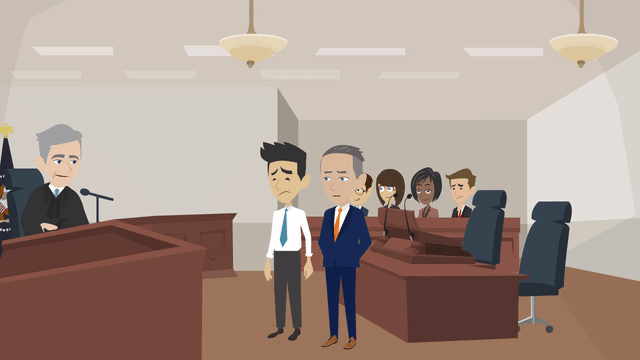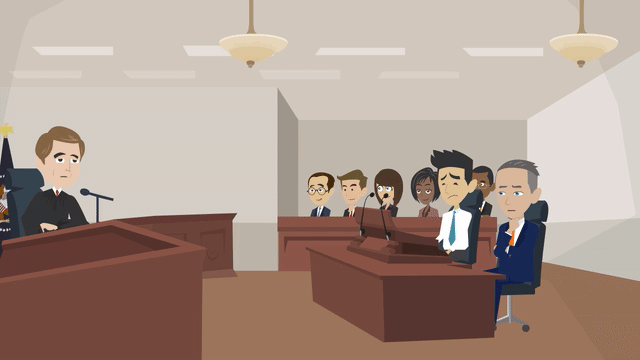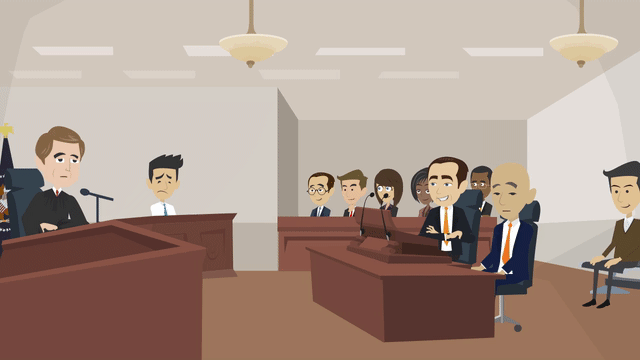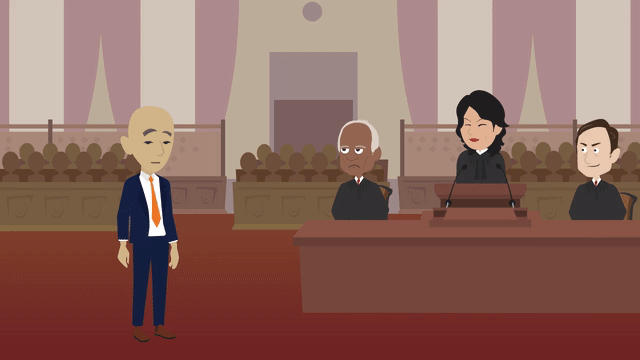White Collar Crime | Lawyers & Attorneys
White Collar crimes are typically non-violent crimes that are committed for financial gain, often in a corporate environment or setting. White Collar crimes include, but are not limited to, the following: bankruptcy fraud, bribery, computer and internet fraud, counterfeiting, credit card fraud, embezzlement, environmental law violations, financial institution fraud, government fraud, healthcare fraud, insider trading, insurance fraud, kickbacks, mail fraud, money laundering, securities fraud, tax evasion, trade secret theft, and public corruption.
Frequently Asked Questions About White Collar Crime
Our criminal defense attorneys provide answers to some important questions below.
There are similarities and differences between the two. While the same standard of proof for a conviction applies, how a case is handled between State and Federal Courts differs drastically. In resolving a case in State Court, your white collar criminal defense lawyer can negotiate the exact outcome with the Prosecutor or District Attorney, conference the case with a judge, and tell you prior to sentencing whether there will be incarceration, a term of probation, or what the restitution amount will be. On the other hand, in Federal Court, when a case is resolved the ultimate outcome is decided by the Judge at the date of the sentence. While certain factual matters and dollar figure amounts can be agreed to with the Government or U.S. Attorney’s Office, these stipulations are ultimately not binding on the Court. Prior to the sentencing in Federal Court, you will only know if there is maximum penalty and/or a mandatory minimum sentence, and the federal sentencing guideline offense level recommendation, but you will not know the exact penalty until the date of sentencing.
In Federal Court, all crimes are provided a base offense level. Your base offense level is then adjusted upward or downward depending on your involvement in the case, and the offense characteristics and circumstances. Your criminal history category is also calculated based upon your prior conviction history. Based on your offense level and criminal history category, you can find the recommended sentencing guideline range for your crime. The guideline range is a suggested number of months of incarceration. While the guideline range is not a mandatory sentencing range, and only serves as a guide for a Federal Judge to consider when imposing a sentence, many judges place great weight on the Federal Sentencing Guideline Range.
No. The Federal Sentencing Guidelines are no longer mandatory by decision of the Supreme Court. They provide a set of factors that a Judge must account for when issuing an appropriate sentence. Other sentencing considerations not included in the sentencing guideline calculation include how a defendant behaves after his arrest ,if there is mental health or substance abuse issues and whether the defendant commits to treatment and counseling; whether restitution can be paid; what amount of harm was caused to the victim; whether the defendant suffers from any medical conditions; whether the defendant has family support; whether the defendant is employed ; and whether the defendant has the support of family and friends in the community.
It is critical to work with your attorney so that a judge will be able to see you as the person you are, and not just the offense you committed.
Criminal cases involve allegations that a crime was committed. In criminal cases the government is seeking a conviction. Charges are prosecuted by local District Attorney’s Offices, the New York State Attorney General, or Federal United States Attorney’s Office. If convicted, you could face potential incarceration, fines, surcharges, and restitution.
Civil cases are brought to seek money damages or to attempt to stop certain behavior or actions, legally known as injunctions. Civil cases can be filed by individuals, corporations, or the government.
This is a very difficult question to answer, but it could be both. Many investigations start as civil inquiries and end up identifying criminal actions. The same is also true for criminal investigations. Many criminal investigations end up resolving with civil resolutions.
Ultimately what distinguishes a civil action versus a criminal problem are intent and actions. In other words, did the problem occur because of an underlying criminal act. Many factors go into determining how a case is investigated. Certainly, it is always better to be working in the civil realm versus the criminal arena based on the potential punishment. In the civil context, you can be required to stop performing a certain action or pay penalties, interests and other monetary damages. In the criminal context, you can face civil penalties in addition to incarceration and a criminal record.
Yes. Although it is rare, you can be charged with the same offense or fact scenario in both State and Federal Courts. State and Federal Prosecutors will usually get together and decide whether the case should be handled on the State or Federal level. Many considerations go into this choice including the nature of the crime, the potential punishment, the workload of a prosecutor or agency, and who discovered or investigated the crime. For example, when cases are prosecuted in both State and Federal Courts for the same conduct, the State would prosecute a larceny and the Federal side would prosecute a tax evasion charge.
Ask your attorney about the Petite Policy, which is an internal Justice Department guide which states that absent compelling federal interests, the Federal Government should not prosecute whenever a State has done so. This is merely a guide; however, it is worth examining if you find yourself in this situation.
An internal investigation is when a company has some indication or allegation of wrongdoing or improper actions by its employees or corporate officers and the company wants to determine, what, if any, validity there are to these claims. These allegations can come from an internal company source or from a governmental investigation. Ultimately, the investigation is used to determine if there was any wrongdoing, and, if so, to correct the problem. At the end of the investigation it may be helpful for a formal report to be generated that identifies the allegation, the nature of the investigation, the findings, whether disciplinary action was taken, and the recommendations for corrective action.
Internal Investigations can be as minor or as complicated as the needs present. They may include interviews, forensic financial audits, document review, and legal analysis / memorandums.
There is no definite answer to this question, however the sooner the better after potential misconduct is discovered. When a company has knowledge of alleged impropriety, it is best for the company to get out in front of the investigation and to conduct its own complete and thorough investigation. In many cases, if a corporate investigation is conducted properly, a governmental agency will rely on the findings of the internal corporate investigation. When conducting an internal corporate investigation, it is always best to develop a plan that protects the attorney client privilege of the company. Based on the results of the internal investigation, the company will be in a better place to determine its next course of action, including the possibility of self-disclosure, settlement, or taking the position that the company did not do anything wrong.
Failing to act could turn an otherwise isolated incident into civil or criminal consequences for those who learned of what was occurring and did nothing.
There is no exact formula or way to conduct an internal investigation. The allegation of wrongdoing or impropriety depends on the scope of the investigation. Most internal investigations include reviewing materials such as emails/text messages, interviewing employees, reviewing office policy and procedures, personnel files/employee reviews, board minutes, billing records, bank transactions, tax returns and other relevant documents.
This again depends on the nature and scope of the allegation and wrongdoing. Depending on the investigation, it will be important to determine whether the investigation should be conducted by outside counsel, in-house counsel, a company’s HR department or compliance officer. Depending on the allegations, auditors, accountants, and/or forensic consultants may be necessary to assist in the investigation. It is recommended that attorneys be responsible for the investigation as the attorney client privilege or attorney work product privilege can be asserted. Hiring outside counsel may provide a greater level of security and protection, as well as the availability to provide a complete and unbiased opinion.
Attorney review may also aid in deciding if additional/individual counsel may be necessary for one or more individuals. Even in those cases, there is a potential for joint-defense agreements that may be in the best interests of everyone involved as well as the company.
Not usually. Statements made during an internal investigation by an employee are not privileged or confidential unless there is a joint defense agreement in place for the employee. However, as part of the internal investigation, the statements of the employee are protected and privileged as it pertains to the corporation. The corporation has the ultimate choice as to whether to keep the statement confidential or disclose the contents as the company deems appropriate.
An Upjohn Warning refers to language contained in Upjohn Co. v. United States, 449 US 383 (1981), which provided greater protections to corporations with respect to attorney client privilege in conducting internal interviews. Essentially, the Upjohn Warnings tell the employee that the attorney that is conducting the interview represents the employer and not the employee; that there is no attorney client privilege between the attorney and the employee; and that the company has the right to either disclose the contents of the communication or assert the attorney client privilege with respect to the communication between the attorney and the employee. The Upjohn Warning acts as a corporate Miranda Warning.
Yes. Employees are required to participate in internal investigations, or they may be subject to employee discipline. In an internal interview, the employee must answer questions or participate in the investigation.
Yes, or you will be subject to employee discipline. An employee must participate in an investigation.
Failure to participate can result in discipline including termination. An employee who does not want to answer questions may request their own lawyer. However, an employer does not have to allow the attorney to participate in the investigation.
You may request your own attorney during a corporate investigation. Your company does not have to allow for one. A lawyer is not required, and a company has a right to deny the access of an attorney during an internal investigation. Contacting a lawyer is always a good idea in these situations to receive advice about whether to participate in the internal investigation. For example, if you are accused of committing a crime, it may be better to lose your job than to make statements that could be used against you in a criminal case.
Also, even if the corporation ultimately denies full access to the attorney, they may be more willing to engage in negotiations with them on your behalf.
An employee who lies or does not tell the truth during an internal investigation is subject to discipline including termination.
Yes. Your company may pay for you have your own counsel. If you are requested to give a statement or meet with law enforcement personnel, you have the right to be represented by a lawyer. You should ask your company if they are willing to pay for your legal fees. You can hire a lawyer of your choice. Your company may recommend a lawyer(s) for you to consider. You have the right to utilize these suggestions or to hire someone on your own.
It is critical you understand the difference between speaking during an internal investigation and speaking to law enforcement. While you may request an attorney during an internal investigation, the corporation may reject that request. You face termination for failing to participate. If being questioned by law enforcement, you have the absolute right to an attorney during questioning and your request cannot be denied.
No. Absent a contractual obligation, your company does not have to pay for or provide you with an attorney. You are always allowed to contact and hire a lawyer of your choice.
When contacted by law enforcement, you have three options: (1) speak with law enforcement; (2) refuse to speak; or (3) ask for time to respond after you have had time to consult with an attorney.
It is always advisable to contact an attorney prior to speaking with law enforcement. You do not have an obligation to speak with law enforcement. If you would like to speak to an attorney, you should be polite and ask for contact information and advise the law enforcement agent that you will have your lawyer contact them.
A subpoena is a request for documents to be provided at a date and time in the future. In other words, you do not have to immediately turn over the records requested in the subpoena. If you or your company receive a subpoena, you should immediately contact a lawyer. Your lawyer may be able to extend the time frame to respond, reduce the scope of the subpoena, or file a motion to quash the subpoena.
It is important to distinguish the difference between a warrant and a subpoena. A warrant is executed by law enforcement in the context of a criminal case and states the time, location, and items that can be collected pursuant to the warrant. Once a warrant is issued there is nothing that can be done to stop a search. If law enforcement indicates they have a warrant, you should comply immediately and ask to contact an attorney. Law enforcement is not required to immediately show you the warrant, however they are not allowed to lie about having one. Legal challenges to the warrant and/or its execution can be brought later.
Yes. If you are being investigated by the Federal Government and lie to a federal law enforcement agent or United States Attorney, you can be prosecuted and charged with a violation of 18 U.S.C. § 1001 for making a false statement. While it is not a crime to lie to law enforcement conducting a state investigation nonetheless, you could be charged with obstruction, filing a false instrument or perjury if your false statement were written or otherwise provided during sworn testimony. It is recommended that you consult with and/or hire an attorney PRIOR to discussing anything with law enforcement.
Sometimes after an internal investigation is completed, a company may have to decide whether to provide information to the government or governmental agency of their internal wrongdoing. Making this decision is very difficult and should be made with the advice of counsel. The benefits of self-disclosure or self-reporting include showing the government that your own internal compliance and controls have found a problem and that the problem has now been fixed. The government or governmental agency may accept your report and not initiate a full-blown investigation. The downside of self-reporting is that there is no way to prevent the government from conducting their own criminal or civil investigation. In these cases, if the government believes the self-report was not enough, the potential consequences could be worse. Self-disclosing or reporting may also provide waivers of the attorney client privilege. The decision to self-disclose often comes down to the nature of the allegation, whether there is a pending investigation, and whether the problem can readily be fixed or remedied.
In many circumstances, the government or governmental agency expects and requires self-disclosure of a problem or issue. Self-disclosure can eliminate or lesson potential civil or criminal penalties or charges. Self-disclosing or reporting can be beneficial, but there is no guarantee.
Remediating a problem is always helpful. However, fixing a problem may not eliminate or lessen the consequences. Whether it is an investigation, a civil lawsuit or a criminal matter, it is always better to say that a problem was identified and is now corrected. In civil cases, remediating a problem cannot be used against you.
In the criminal context, it is always beneficial to state that as soon as a problem was identified that it was addressed and fixed. In addition, it is important to put in place policies, procedures and mechanisms so the conduct does not occur again in the future. Also, doing so may trigger the end of the problematic action and therefore begin the statute of limitations of any potential liability.
A joint defense agreement allows communications, work product and documents to be shared confidentially between multiple parties and their attorneys in an investigation, or an initiated civil lawsuit or pending criminal charge. Joint defense agreements can be either written or oral. However, it always preferred as soon as practicable to formalize an oral joint defense agreement in writing so there is no confusion as to the parameters of the agreement. The joint defense agreement should be signed by all parties and their respective attorneys. The downside of a signed joint defense agreement is that the document, in whole or in part, may be subject to disclosure during a litigation.
The common interest privilege provides protection for information or communication between parties in a litigation or investigation that share a common legal interest. The common interest privilege is also known as the joint defense privilege. This allows for meetings and communications to occur with multiple parties and their lawyers while maintaining attorney client confidentiality.
A qui tam lawsuit allows an individual, called the relator or whistleblower, to bring a civil lawsuit under the Federal False Claims Act or the New York State False Claims Act on behalf of the government. The purpose is to reward people for identifying crimes or fraud committed against the government. These cases are filed under seal to allow the government the opportunity to determine if they want to intervene and prosecute the case or decline the prosecution and allow the relator to pursue the case on their own. In either scenario, in a successful case, the relator is entitled to a portion of the recovery and reasonable attorney’s fees will be awarded.
If you have information regarding an ongoing corporate fraud, contacting an attorney prior to law enforcement may help assess your case, and properly direct you to the appropriate state or federal agents.
Any person or organization with knowledge of a fraud being perpetrated against the government can be a whistleblower. Often, a whistleblower comes from the company that is committing the fraud, but this is not a requirement.
The company cannot retaliate against the whistleblower. A lawyer can protect you from employment discrimination or retaliation following your disclosure of illegal corporate conduct.
The penalties in a qui tam case can be extraordinary. The Federal False Claims Act allows for treble damages, or three (3) times what the government paid for each false claim and a per claim penalty of a minimum of $11,462 and a maximum of $23,331 per claim. In New York state, the per claim penalty amount is between $6,000 and $12,000. As such, the penalties associated with a qui tam case can be extremely high.
The statute of limitations for a qui tam action is the longer of:
- 6 years from when the fraud is committed; or
- 3 years after the United States/New York knows or should know about the material facts, but not more than 10 years after the violation.
Yes. New York State has its own False Claim Act under the State Finance Law. The New York False Claim Act is very similar to the Federal False Claims Act.
Timeline of a Criminal Defense Case
- Whether you just made a big mistake, or are being falsely accused, this can be a very emotional and important time in a case
- It is very important that you remain silent and not answer any questions about the case without a lawyer present
- Contact a criminal defense attorney as soon as possible
- Confirm the lawyer is an experienced criminal defense lawyer
- Meet with the lawyer who will help you understand the process of a criminal case
- If you have been arrested, critical proceedings and time frames begin immediately
- You will appear before a judge who will determine if you will be incarcerated, released on bail or supervision, or released without conditions
- If you are charged with a felony in a town, village or city court, the prosecuting agency will have six months from the date of your arrest to determine whether to present your case to a grand jury to seek an indictment or return your case to a lower court to be handled as a misdemeanor
- Discovery is the exchange of information between the governmental agency prosecuting you, you, and your attorney
- In New York State this process begins shortly after your appearance in court
- You can expect exchange of the following if it exists in your case:
- Police Reports
- Investigative Notes
- Videos / Body Camera Footage / Dash Camera Footage
- Forensic Reports
- Photographs
- Exculpatory Material (Brady)
- Impeachment Material
- You and your attorney may also be engaged in information gathering that includes:
- Freedom of Information Law (FOIL) Requests/Responses
- Additional Witness Interviews
- Expert Evaluations / Disclosures
- Motions are written applications to the court to request any of the following:
- Preclude Evidence
- Suppress Evidence
- Seek a Ruling on a Constitutional Rights Violation
- Seek Outright Dismissal of One or More Charges Based on Legal/Factual Matters
- Request Hearings
- A plea bargain is an offer from the prosecuting attorney to resolve your case
- Whether to plead guilty or not is always a choice you get to make, not your attorney
- Your attorney will meet with you, discuss the facts and the law of your case, and offer advice. A plea offer takes into consideration your charges as well as:
- Prior criminal history if any
- Life experiences
- Evidentiary Problems
- Post-Incident Actions
- Mental Health Counseling
- Substance Abuse Treatment
- Anger Management Treatment
- If you choose not to accept a plea bargain and are heading to trial, there are likely to be hearings to consider the following:
- Preclusion/Suppression of Evidence
- Admissibility of Evidence
- What Prior Criminal History/Bad Acts May Be Introduced by the Prosecutor if You Testify on Your Own Behalf
- During a hearing, there is no jury, and the judge will make factual and legal determinations regarding what evidence will be allowed at trial.
- You have the right to a trial by a fair and impartial jury or by the judge who will act as both judge and jury
- At a trial, the prosecution has the burden to prove your guilt beyond a reasonable doubt
- The judge or jury will listen to the evidence presented and the arguments by the lawyers, apply the facts to the law, and render a verdict of not guilty or guilty
- A Verdict must be unanimous
- If you are convicted at trial, or if you entered a plea bargain, there will be a sentencing date where your punishment will be imposed by the judge
- If you previously entered a plea bargain, the judge will likely impose the agreed upon sentence at that time
- In the event you are convicted, you have the right to appeal
- This is true whether you plead guilty or are convicted after trial
- However, by accepting a plea bargain, you may have waived some of your appellate rights
- It is important that your attorney file a notice of appeal on your behalf and that you discuss the appeal process with your lawyer
LaMarche Safranko Law Testimonials
“Dear Andrew and George,
I cannot thank you enough for your hard work, diligence, and selfless manner that you put towards my legal difficulties in Colonie. From the first moment I met you, you helped reassure me that things were going to turn out in a more favorable manner than I originally thought. Clearly, the final result of my court case displays the quality of time and work that you put into this….
“I cannot thank George E. LaMarche lll and his team for the excellent legal work they provided for my son, and in extension, our entire family. His experience, knowledge of the law, networking ability and communication is second to none. In our case, our son was wrongly accused by a small town police officer and charged with 5 tickets…
“No one likes to be in a bad situation, but if you need a lawyer George is your man. Not only does he point you in the right direction he offers good advice for your future. As much as we bring him business he does not encourage that next time anticipation….
“I am an attorney who found himself in the middle of a serious, personal legal matter that compromised not only my personal life but my professional life as well. I immediately contacted Andrew (Andy) Safranko, Esq. Andy worked tirelessly and extremely hard to bring my legal situation to a very favorable resolution. In so doing, Andy not only saved certain aspects of my personal and professional life…
“Dear Andy,
Thank you so much for everything you have done for our son over the last three years. This has been a very challenging time for our family and the knowledge that our son has an attorney as capable and amazing as you are has given us peace of mind!
“Dear George, Andy and Staff,
Thank you all for your kindness and all your help in getting back to my wellbeing and life. I could not have done it without you all. Everything is going so well again. I recommend you highly. Thanks Again!”
“I wanted to express my deepest appreciation to Mr. Andrew Safranko for the exceptional job he did in regards to my legal representation. Mr. Safranko displayed the utmost in professionalism and discretion during the entire court process, and took the time to explain each and every step….
“I can honestly say that the best decision I’ve ever made was retaining George LaMarche as my attorney. I was in a situation where everything wasat risk; my career, livelihood, and the ability to provide for my family. In desperation, I contacted over a dozen attorneys. The majority of the lawyers I spoke with promised results without seeing paperwork or knowing valuable facts….
“I wanted to take this opportunity to thank you for your excellent representation on my recent matter. I have worked with lawyers, and in law firms much of my professional life, but I have never encountered the rare mix of skill, integrity and humanity in one individual—you….
“Dear Mr. Safranko,
Thank You so much for answering my question, and so expediently!
The dedication, respect, and consideration with which you treat your clients, current and past, is remarkable. It is why I reached out to you when searching in my time of need, and why I would highly recommend…
“The staff at LaMarche Safranko Law took care of whatever I needed, it was just fabulous. It was top shelf, if I called, I got George. If he was in a meeting, they left him a message. He called me right back after the meeting. Everybody was very courteous and very nice there. If I left a voicemail, everybody got back to me quickly. The level of service was very, very good and I would Highly recommend them.”
“The arrest of my husband in 2008 was an extremely difficult and emotional time for our family. The arrest turned our lives upside down. It was sudden and unexpected and had tragic emotional as well as financial consequences. I had no idea what to do under the circumstances….
“My family and I cannot thank George and his staff enough for all of the support and guidance they have given us over the past six months. Anyone who has ever suffered a personal injury knows how difficult they are to overcome, but I’m glad we had such an intelligent and hardworking attorney on our side so I could focus on my recovery rather than on the details of the case….
“Throughout the attorney client relationship regarding my personal injury lawsuit, George and his staff continually exhibited tremendous amounts of legal knowledge, skill, and a vast amount of expert resources that ultimately resulted in a final judgment in my favor. George was there every step of the way to explain where we stood and what to expect next and there was never a need to question his professional judgment…











